GCSE results are out today. And, as ever, we’ve been digging into all the published data to bring you our analysis of all the main trends.
Our analysis will be based on the national figures published today by the Joint Council for Qualifications and Ofqual. If you want more detail about any individual GCSE subject then visit our dedicated results microsite.
This afternoon, we’ll also be running a free webinar where we’ll bring you some key insights live. There’s still time to sign up here.
Grades are up very slightly from last year
The percentage of entries from 16-year-olds in England graded 7 or above is up very slightly compared to last year, from 22.6% to 23.0%. There’s virtually no change in those graded 4 or above or 1 or above.
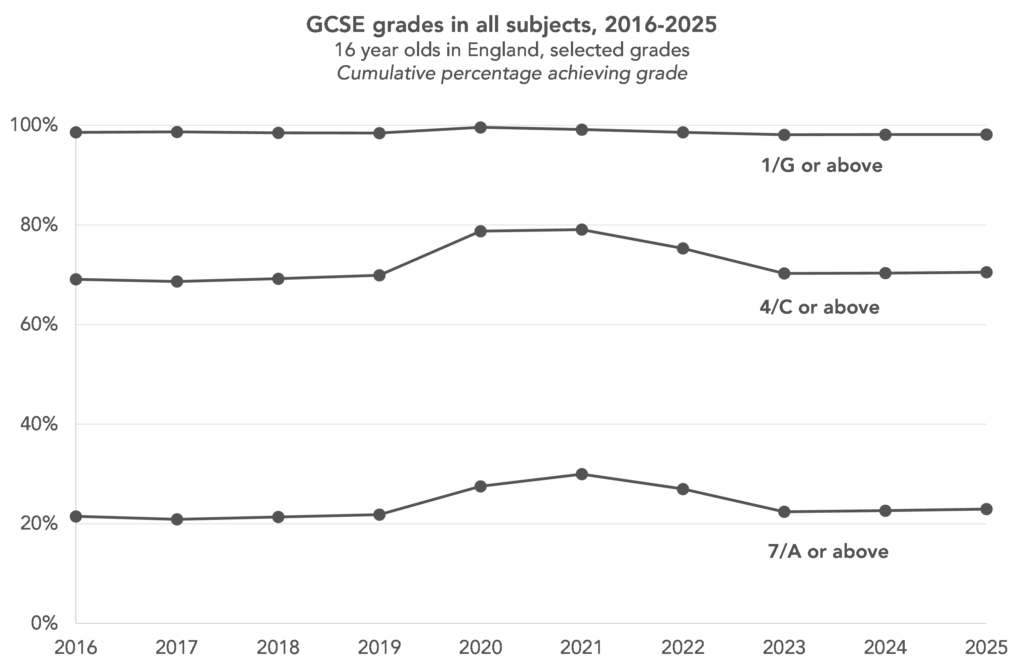
The percentage of top grades has gone up for two years in a row, but the increase since 2023 is still less than one percentage point. Grades do remain somewhat higher than pre-pandemic: in 2019, 21.9% of entries achieved 7 or above.
Grades are also up slightly in Wales in Northern Ireland. Grades in Wales have followed a similar pattern to those in England over the last couple of years, while those in Northern Ireland dipped below 2019 levels last year, but this year are slightly above.
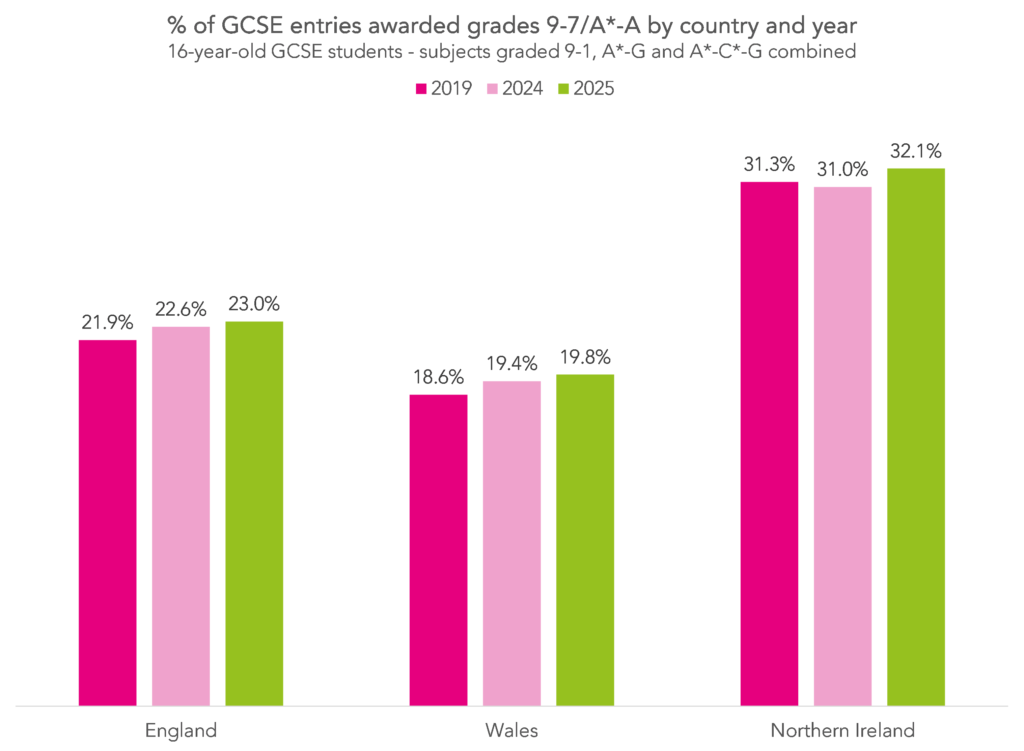
The gender gap in grading is closing
The small increase in top grades is largely driven by male pupils. The percentage of entries from 16-year-old male pupils graded 7 or above has increased from 19.8% to 20.5%, while those from female pupils remain steady at 25.5%. The percentage of entries graded 4 or above has also increased for male pupils, from 67.1% to 67.5%, while for female pupils it has fallen very slightly, from 73.7% to 73.6%.
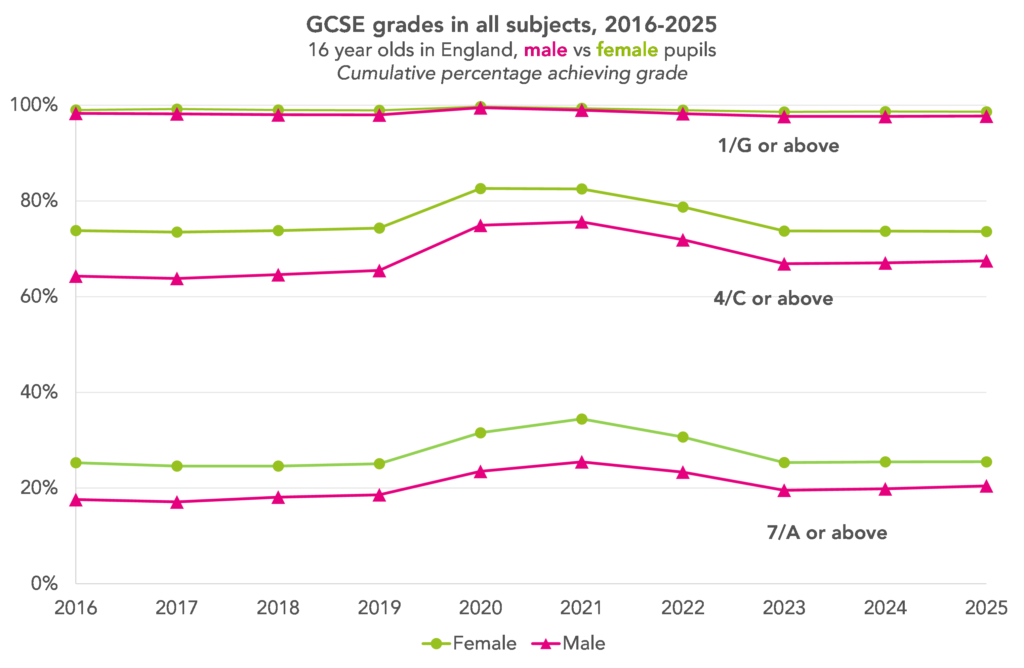
Although female pupils are still more likely to achieve a top grade, the gender gap at grade 7 has fallen every year since 2021, when it stood at a record high of nine percentage points.
Changes over the last couple of years have been small, but the gap at both 7/A and 4/C is now the smallest since separate data for 16-year-olds was first published in 2016.
Numbers of entries are generally lower but some subjects have seen an increase
There were fewer entries in GCSEs by 16-year-olds in England across the board but there were variations between subjects.
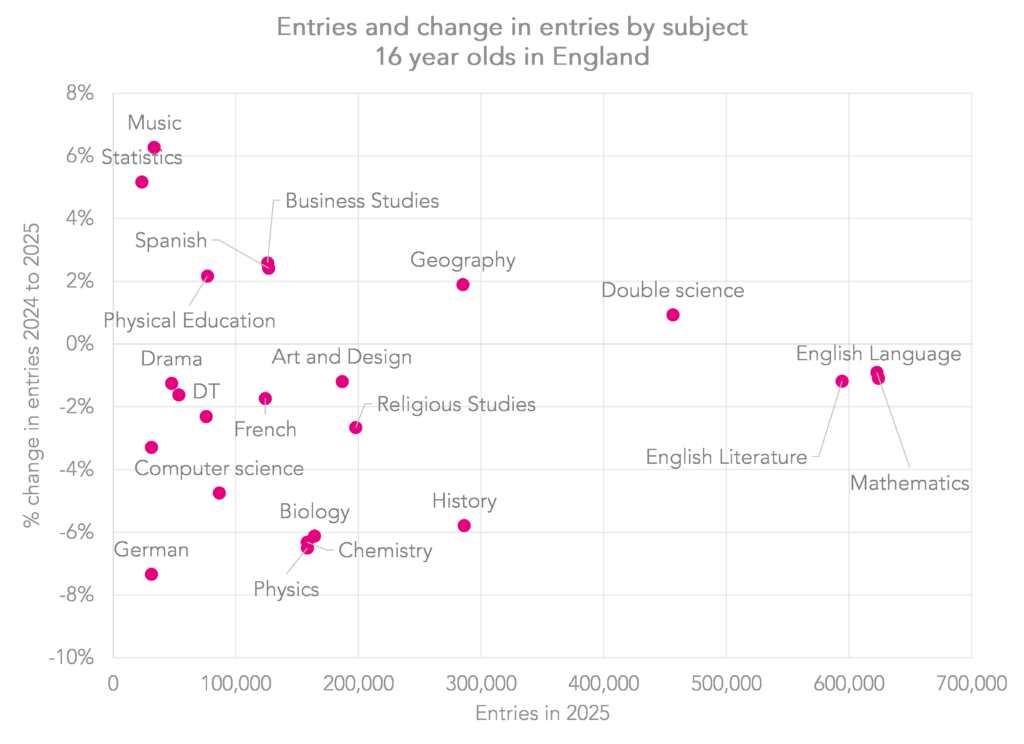
We see a switch from triple science to double science, with entries in biology, chemistry and physics falling by 6% and entries in double science increasing by 2%.
Sign up to our newsletter
If you enjoy our content, why not sign up now to get notified when we publish a new post, or to receive our half termly newsletter?
Entries in History and German also fell by 6%. In the case of history, this follows several years of continual increases. For German this is part of a longer-term trend although there was a slight increase in entries between 2023 and 2024.
Entries in both music and statistics increased for a second successive year.
The “standard pass” rate is down for 16-year-olds in English, stable in maths
Last year, we saw that although the headline “standard pass” rates in England (the proportion of pupils achieving a grade 9-4) for English and maths had fallen, the figures for 16-year-olds had barely changed.
This year, there has been another a fall in the headline rates. From 61.6% to 59.7% in English (64.2% in 2023), and from 59.6% to 58.2% in maths (60.1% in 2023). However, this time, when we remove older pupils re-taking the qualifications at post-16, we see that the percentage of 16-year-old pupils achieving at least a grade 4 in English has also fallen, from 71.2% last year to 70.6% this year. The figures in maths are more similar: 72.0% last year and 71.9% this year.

The percentage of pupils achieving a grade 4 or above is now broadly in-line with 2019’s in English, but remains slightly above in maths.
Why do we bother with the National Reference Test?
This year’s National Reference Test showed an improvement in attainment at the key thresholds in English.
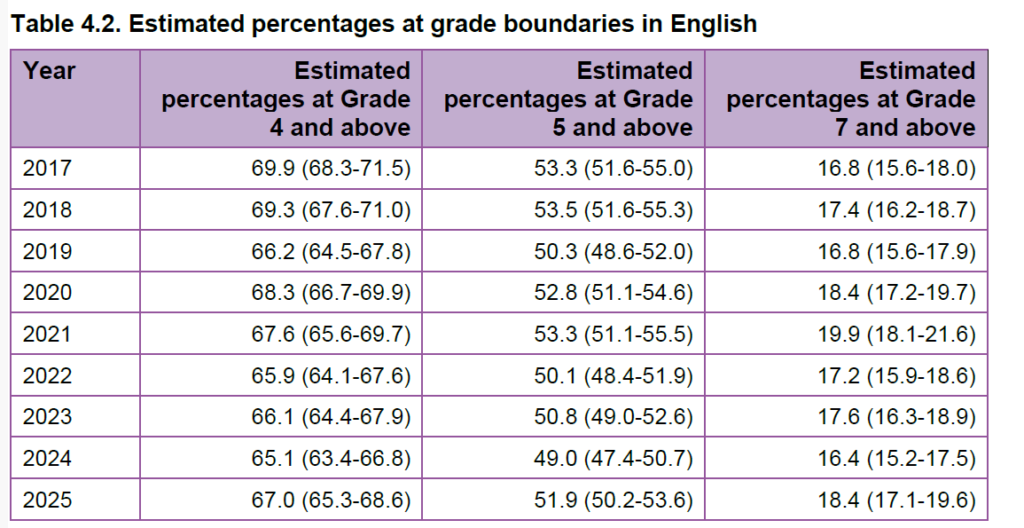 Despite this, GCSE attainment appears to have fallen. 54.2% of 16-year-olds achieved grade 5 or above in English language compared to 55.4% last year.
Despite this, GCSE attainment appears to have fallen. 54.2% of 16-year-olds achieved grade 5 or above in English language compared to 55.4% last year.
Ofqual did not require the awarding bodies to increase grades this year despite the NRT results. This does raise the question of what level of change would be required for them to do so.
In maths, the NRT results appear largely stable compared to last year.
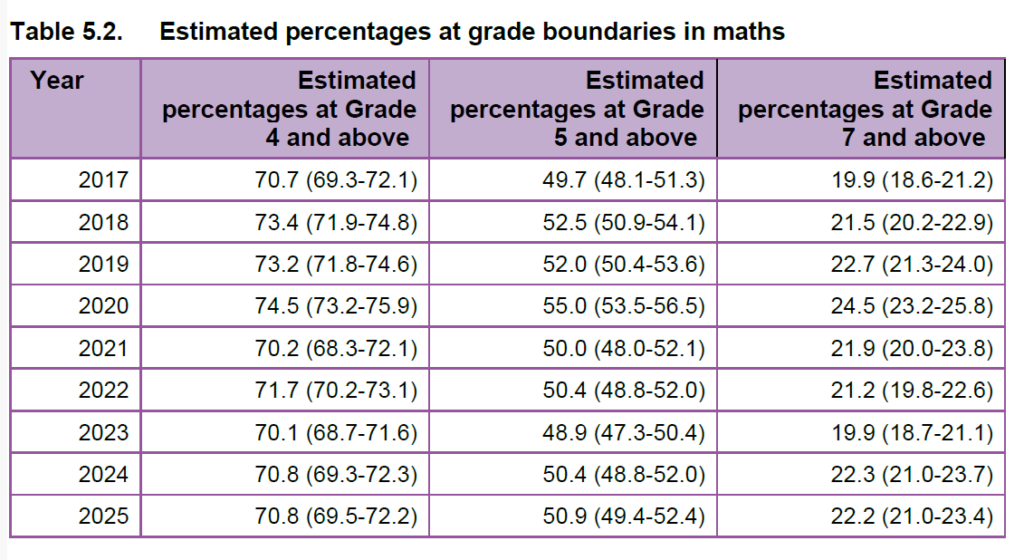
Re-take entries are up, but grades remain low
The number of GCSE entries from older students has increased again this year. There were 346 thousand entries to GCSEs in English and maths from those aged 17-19 this year, compared with 299 thousand last year, an increase of 16 percentage points.
This is mostly driven by 2024’s GCSE cohort being larger than 2023’s, and 2023’s larger than 2022’s. But it’s also partly due to the fall in the proportion of last year’s English language re-take cohort achieving a 9-4 (students must keep re-taking the qualification until they reach this threshold).
Looking at the grades this year, the percentage of students achieving a 9-4 overall is slightly higher than last year in both subjects (19.7% of 17-19-year-olds in English this year vs 19.3% last year, and 15.3% vs 15.0% in maths), but the percentage of 17-year-olds doing so is very slightly lower (22.0% vs 22.1% in English, and 18.1% vs 18.3% in maths).
Overall, the percentage of re-take students achieving grade 4 or above in these subjects remains below pre-pandemic levels, quite dramatically so for English.
Grades overall are up slightly, but not in all subjects
23.0% of all entries by 16-year-olds in England were graded 9-7, up from 22.6% last year. However, there are variations by subject.
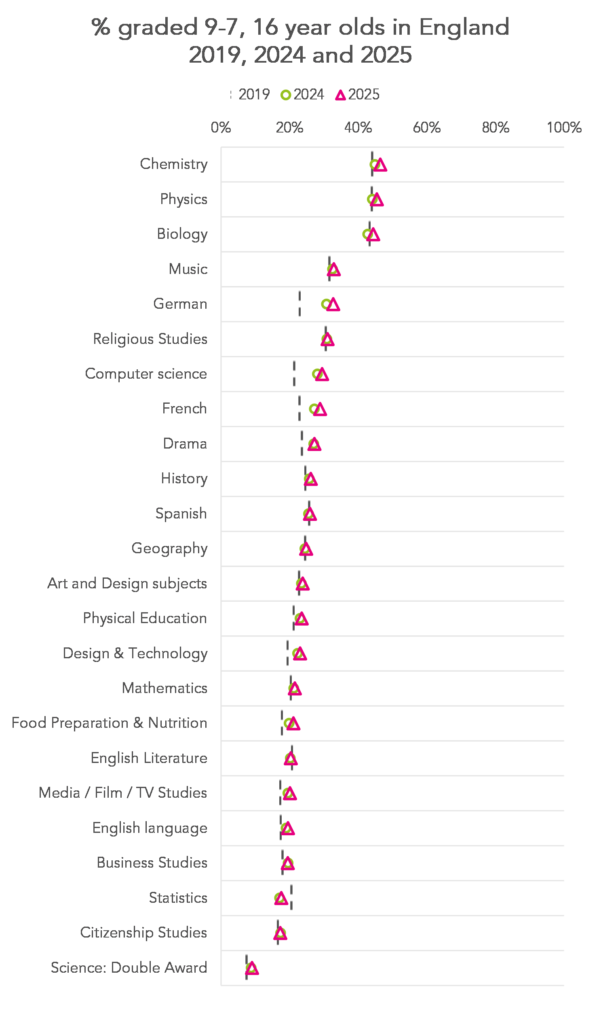
Over 40% of entries were graded 9-7 in the triple sciences, with increases in attainment of 2 percentage points in biology and chemistry and 1 percentage point in physics. Given the fall in entries in these subjects, we might assume that the entry cohort was slightly more able than the previous cohort. This appears to have been detected by examiners in the absence of Key Stage 2 data.
Attainment in French and German (but not Spanish) improved by 2 percentage points. While welcome, this still does not address unfair grading in MFL.
70.5% of all entries by 16-year-olds in England were graded 9-4, up very slightly from 70.4% last year.
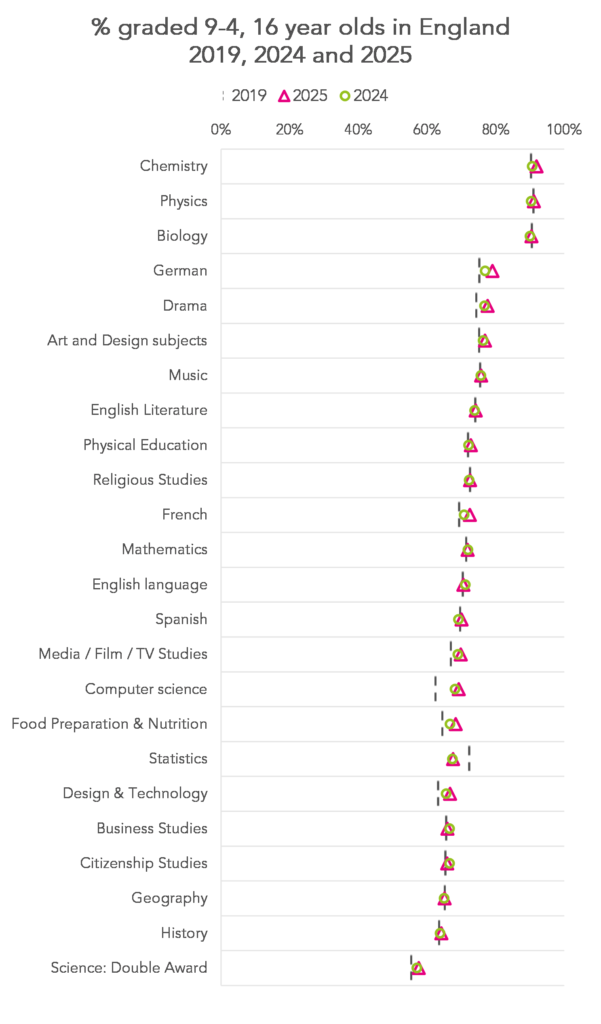
As at 9-7, attainment improved in French and German by 2 percentage points. It did so too in food and nutrition.
At both 9-7 and 9-4 attainment in statistics was lower than in 2019. Entries have increased substantially since 2019. The fall in attainment implies that the cohort has changed substantially over time in prior attainment.
Not much change in attainment by region
This year’s results, at least in terms of 9-7 grades, show little change. Most regions have seen an increase of 0.2 percentage points. London, the top performing region, did not improve this year. As a result the gap between London and other regions has closed slightly.
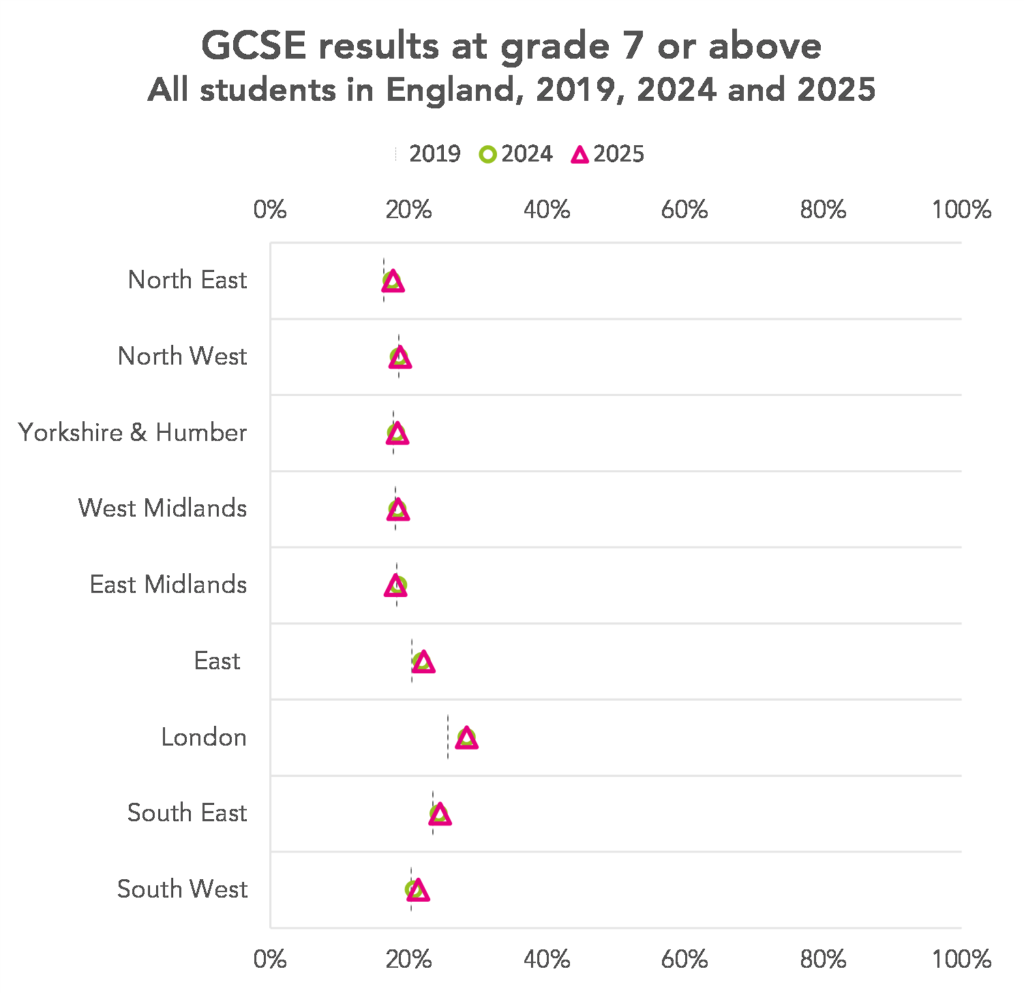
Nonetheless, London has still improved by a greater margin than other regions since 2019.
Always remember that differences in school performances tend to be local rather than regional.
And not much change by centre type either
At least in terms of 9-7 grades, there was also very little change in attainment by centre type in the data published by Ofqual today.
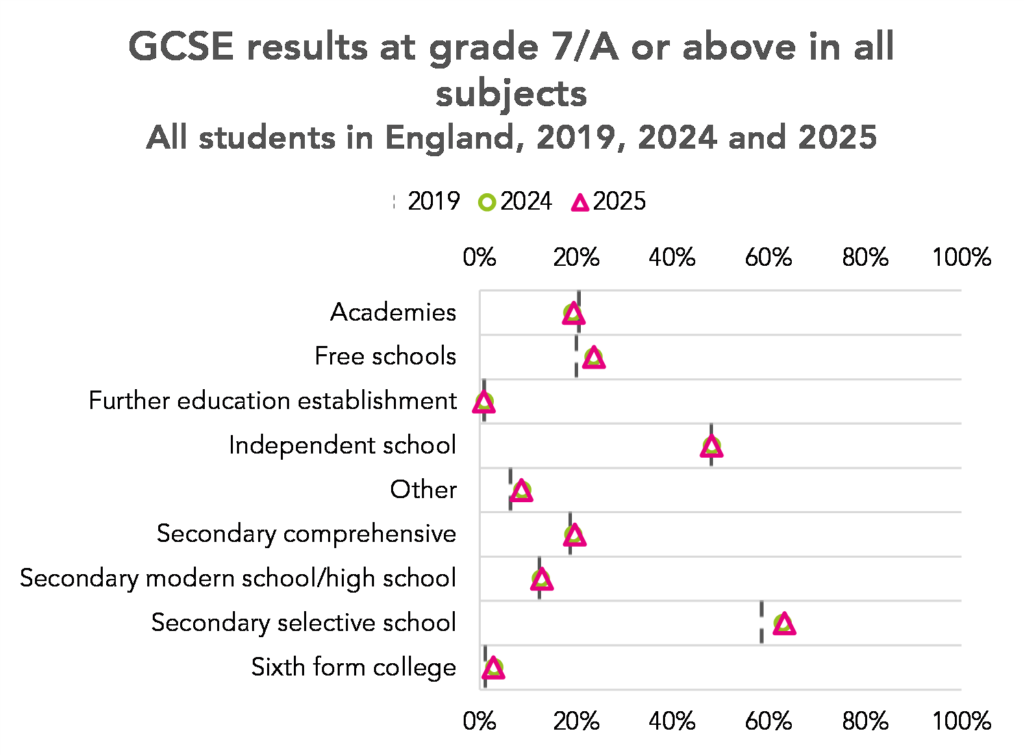
As we always say, we wouldn’t read too much into these figures at this stage. The data for colleges will largely consist of 17-year-olds, whereas results for schools will largely consist of 16 year olds. In addition, the categories are not mutually exclusive. Many selective (grammar) schools are academies, for example. It would be better to wait for the DfE statistical release in October for analysis by centre type.
Attainment in vocational and technical qualifications improved
Attainment in vocational and technical qualifications (VTQs) improved this year, following a fall last year as a consequence of qualification reforms.
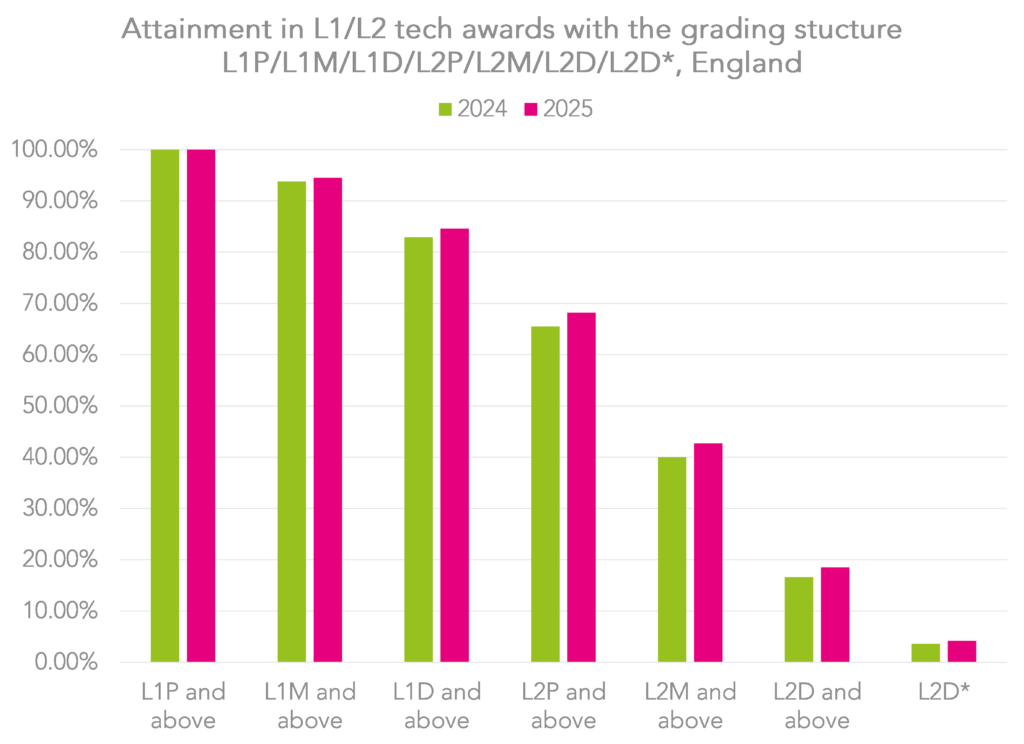
As with GCSEs, numbers of entries in VTQs overall are down by about 1% compared to last year, but there is variation with respect to sector subject areas (SSAs).
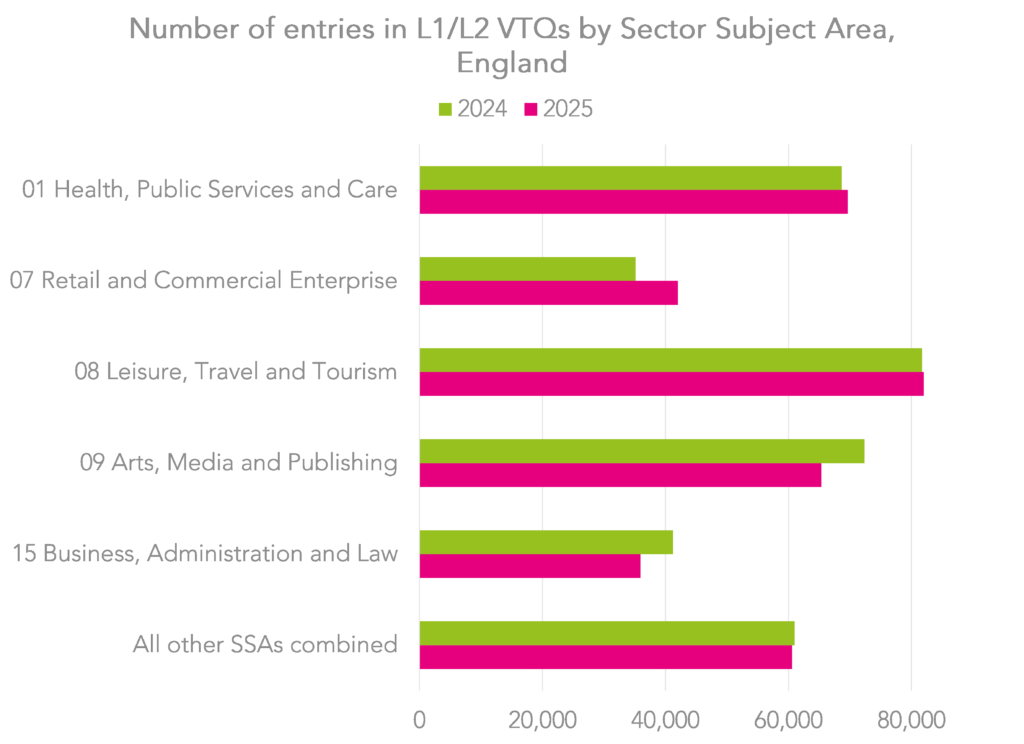
There was an increase in entries in VTQs related to retail and commercial enterprise, but falls in those related to arts, media and publishing and also those related to business, administration and law.
We will be able to see in greater detail whether there has been a shift from VTQ options in music (and other creative subjects) back to GCSE later in the year.



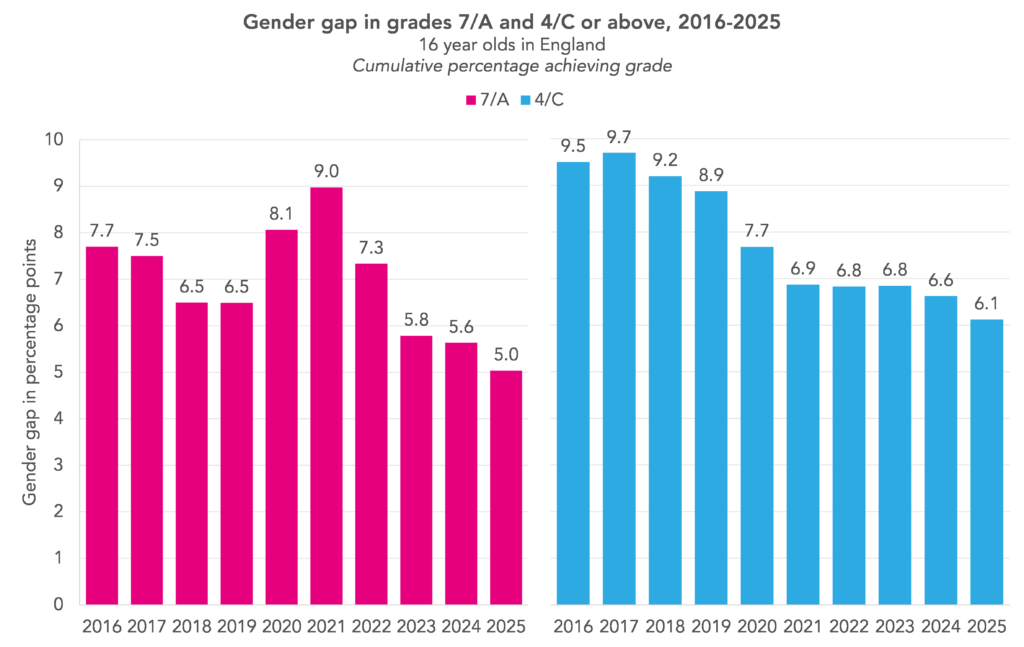
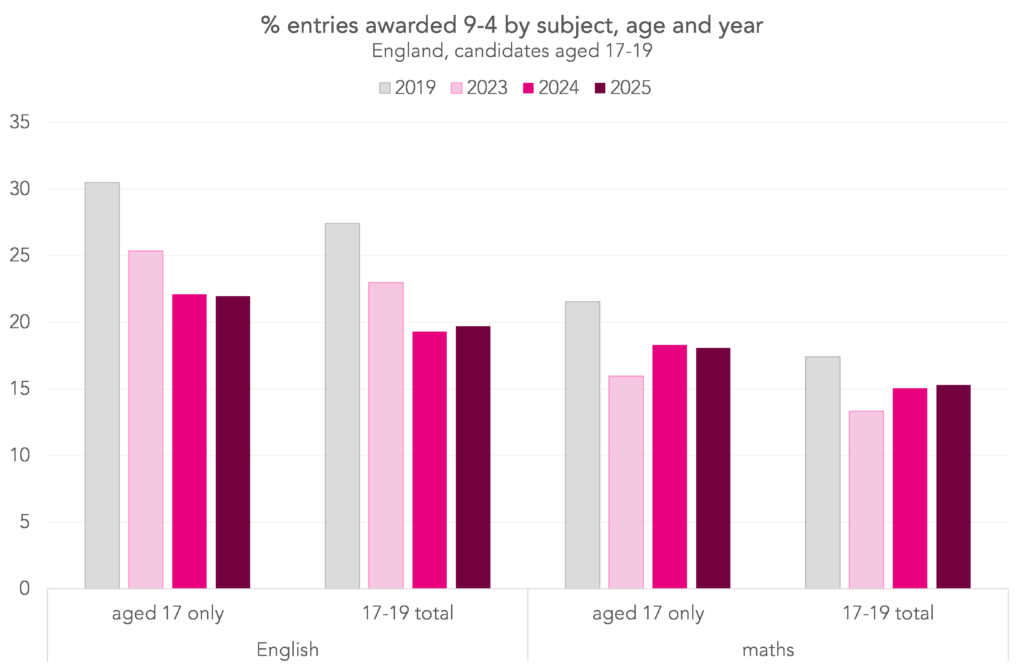
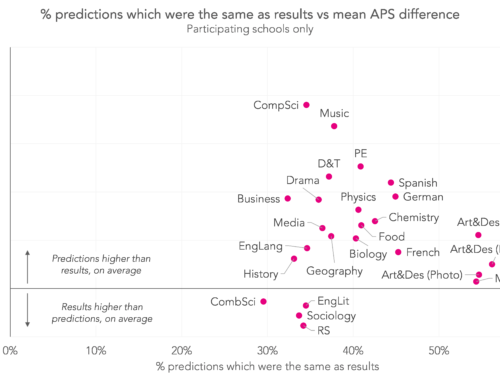

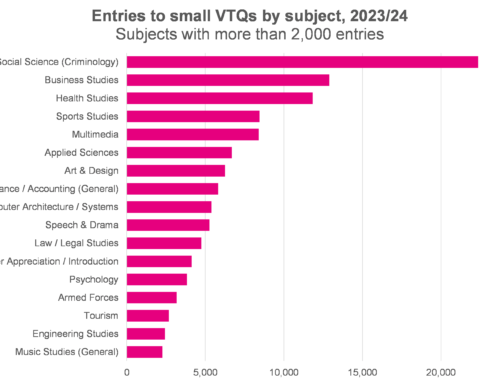
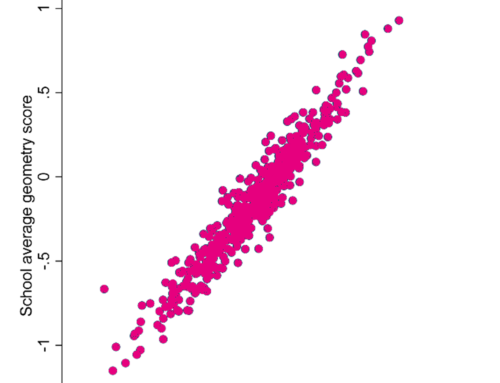
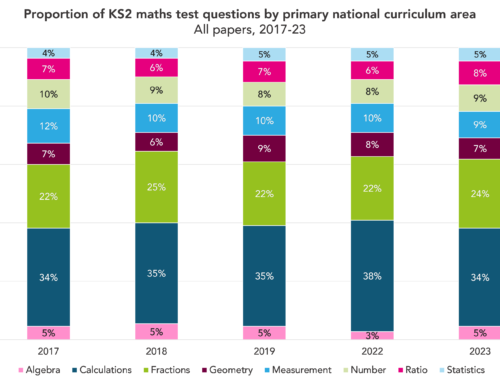
From your article above:
23.0% of all entries by 16-year-olds in England were graded 9-7, up from 22.6% last year. However, there are variations by subject.
70.5% of all entries by 16-year-olds in England were graded 9-7, up very slightly from 70.4% last year.
Do you mean 9-4 in the last line?
Indeed we do, thanks very much for spotting this Lindsey. Now corrected.